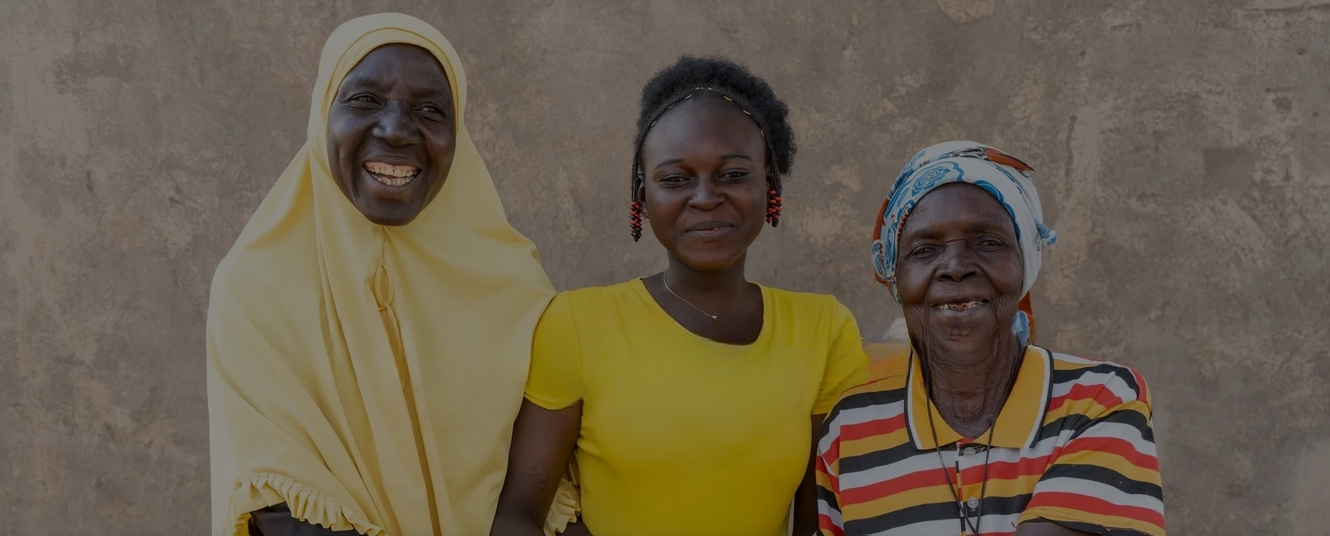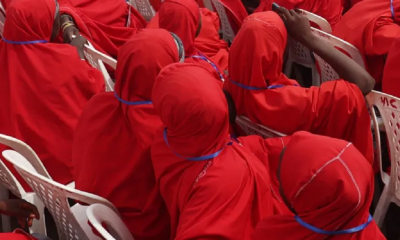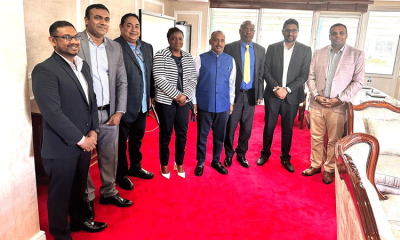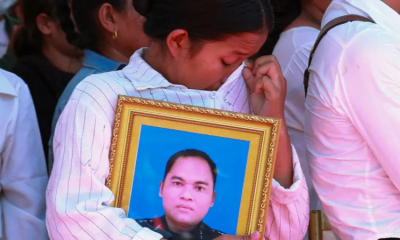Features
Three generations share their experiences of menstruation

“When I was young, a girl who got her first period was scared and frightened,” Burkinabe grandmother Marie, 73, tells her daughter, Aminata, and teenage granddaughter, Nassiratou, 18 – who calls her grandma “Yaaba”.
The three women sit together beneath a tree in their village in west-central Burkina Faso, engaged in forming balls of seeds to make a condiment called soumbala. “The girl’s mother would give her a sheepskin to sleep on until the bleeding stopped,” confides Marie. “At that time, girls and women were isolated during their periods. They washed their sheepskin and protective cloths every day, which is why in the Moore language, we use the word ‘washing’ to refer to the time of menstruation.”
In Paraguay, 73-year-old grandmother Maria also shared her experience of periods with her daughter, Ester, 51, and 16-year-old granddaughter Alma, Ester’s niece. “We didn’t use to talk about it,” Maria says. “We, in secret, had to deal with it and there were no sanitary pads or anything. You had to use cloths, wash and iron them.”
![[Photo: Plan International]](https://www.aljazeera.com/wp-content/uploads/2024/05/PlanInternationalPy-125-1716301827.jpg?w=770&quality=80)
On any given day, in all corners of the world, about 300 million women and girls are having their periods, according to a report by a collection of non-governmental organisations (NGOs) advocating for investment in menstrual health.. At the same time, one in four lack access to menstrual health products or clean toilets reserved for girls, according to a report by the social change non-profit advisory group, FSG.
Some are forced to use materials such as old newspapers, rags, earth, sand, ash, grass or leaves to manage their periods – like grandmother Bui Non in Cambodia, who, as a young girl, used pieces of a sarong as makeshift sanitary towels. “I cut the fabric into pieces,” Bui Non, 57, says. “After a week, I buried or burnt those fabrics.”
Taboos, stigma and myths from long ago still abound in many rural communities around the world, with a culture of silence and shame often surrounding the issue of menstruation. Beninese grandmother Angel remembers how women in her day were not allowed to cook over a fire or serve food to their fathers if they were menstruating.
For Inna, a Togolese grandmother, things were even more challenging. “The family had to find a room on the roadside where the menstruating girl had to spend her entire period. Then, the family alerted the whole village.” Still, in many communities, girls are excluded from everyday life and opportunities, especially school, when they are on their period.
Nowadays, when girls are able to manage and talk about their periods, it is often down to longstanding community health projects working with girls and boys, women and men to encourage intergenerational dialogue to break down taboos and barriers about menstrual health. “It’s a matter of rights,” says Inna’s 16-year-old granddaughter, Denise, who – like all the teenagers in this article – participates in such a community project run by Plan International, a humanitarian organisation working to advance children’s rights and equality for girls in 80 countries around the world.
“Before, no head of the family would allow a discussion session like the one we’re having today about menstruation in his family,” agrees Aminata in Burkina Faso. “The change nowadays is clear.”

Marie, 76, in Burkina Faso, demonstrates the type of cloth she was forced to use as a young girl when she had her periods [Plan International]
In the past, women in Burkina Faso used a thick, traditional, cotton cloth called Faso Danfani to manage their periods, which, says 76-year-old grandmother, Marie, often caused irritation between the thighs. By the time her daughter Aminata got her period, a newer, cheaper industrial wax fabric was available. “Our mothers gave us pieces of cloth to protect ourselves,” explains Aminata, “and that was it; we didn’t talk about it any more.” At first, Aminata found talking about periods to her own daughter awkward – “because we were both ashamed”, she says, laughing. “Now, we still talk about it with a little embarrassment, but thanks to the awareness sessions, we’ve understood that menstruation is completely normal, and it’s important to talk about it.”
![[Photo: Plan International/IssoEmmanuelBationo]](https://www.aljazeera.com/wp-content/uploads/2024/05/DSC08337-1716301510.jpg?w=770&quality=80)
As she speaks, Aminata is helping her daughter, Nassi, 18, who calls her “M’maa”, lift a large basket onto her head. It is not particularly heavy but Burkinabe women traditionally help each other put things on their heads, symbolising solidarity and togetherness.
“In my community, a woman on her period who takes proper precautions can do whatever she wants and go wherever she wants,” says Nassiratou. Not all the taboos have been lifted: “However, she shouldn’t cook for the Muslim fast, go to the mosque, touch the Quran, approach fetish altars, or touch certain traditional medicines.”
Nassi has her own toilet, and when she needs sanitary pads, she asks her mother for money to buy them. “Today’s discussion has brought me a lot, because it allowed me to travel through three generations – my grandmother’s, my mother’s, and mine. Before, I was ashamed to talk about periods with my mother, but now I’m comfortable. I can even talk about it with my grandmother!”

Assana, 24, (right) with her mother, Gnoussiado, 60, whom she calls ‘Inami’, and her grandmother, Akoyiki, 80, whom she calls ‘Afeno’, in their village in Togo [Plan International]
“When I was young, girls who were on their periods were not allowed to prepare or serve food to their fathers,” says Akoyiki. “That practice was known to everybody, and no girl would be accused of laziness or lack of respect for it.”
In the past, women in her village of Elavagnon in Togo used pieces of red cloth as sanitary pads, which were held in place by a string of pearls fastened around their waists.
“Once the cloth was nice and tight, we felt very comfortable,” says Assana’s mother, Gnoussiado. “In our time, a girl on her period could not be seen by, or interact with men, with the exception of her husband. The girl on her period was not allowed to go out as she pleased.”
Though Assana, 24, admits girls still get teased if they have a stain on their clothes, things have changed for the better. “We wear pants and bras. For our generation, we’re more comfortable thanks to disposable pads that can be bought everywhere. Even during our periods, we’re able to do any kind of activities without worrying too much.”

“It was difficult for me during my periods because I was afraid of staining my uniform,” says Blanche, who attends a club in Benin run by Plan International, which teaches girls about menstrual health and encourages and facilitates intergenerational dialogue on the subject.
“My school didn’t have toilets adapted to the needs of girls, and I had to go home every time to freshen up. Several times I missed my lessons. The distance between the house and the school is not negligible, and it was difficult to commute each time.”
Grandmother Angel got her first period when she was 15. “I spoke to my mum about it straight away, and she got me a piece of loincloth. You hung the piece of cloth on a belt of pearls around your waist. We usually reinforced the filling with another one.”
![[Photo: Plan International/IzlaBethdavid]](https://www.aljazeera.com/wp-content/uploads/2024/05/Benin-2024_IzlaBethdavid-2163-1716301459.jpg?w=770&quality=80)
When Angel was young, it was forbidden for girls on their period to prepare food for their father. “The fathers made spiritual amulets to protect themselves and their families, but these items lost their powers when they came into contact with menstruating women.
“Girls were also forbidden from handling fire during their periods – that is, cooking, because of the risk of bleeding too much. We were careful not to get too close to the fire, it was too strong. We were also careful not to eat too much sugar or fat.”
In contrast, Angel’s daughter, Pierrette, who is now 42, was allowed to cook for the whole family, though many myths remained, and she avoided going out during her period – often for practical reasons. “When I tried to walk a long distance, I got injuries between my thighs caused by the fabric padding rubbing against my skin, which was painful and very annoying.”

Seila, 13, (right) with her mother, Sokna, 35, (left) and her grandmother, Bui Non, 57 (centre) in Siem Reap province, Cambodia [Plan International]
“We didn’t have sanitary pads in my day,” says Bui Non, 57, who lives in Cambodia, “so I cut fabric from a sarong into pieces. I washed them to reuse for only a week. After a week, I buried or burnt those fabrics – unlike now, where you can easily buy and use sanitary pads.”
“When my daughter had her period, I kept telling her to clean herself and use fabric as a pad. If she felt sick, I’d help by doing skin coining once per period – we rub balm into the chest, back and shoulders until red is seen. This could relieve the pain.”
“I didn’t have access to sanitary pads when I was Seila’s age,” says Sokna, 35, whose daughter is 13. “I used soft fabric by cutting a skirt, a sarong or shorts. The hard fabric could burn my thighs, making me feel uncomfortable and sweaty. I took a shower three times daily to feel fresh.”

Teenager Seila learned about periods from different sources, including watching videos and reading posts online, as well as from her grandmother. “I feel comfortable discussing menstruation with my close friends, but I haven’t discussed menstruation with any male family members or friends yet. I feel embarrassed about it.”
 Rahamatu, 19, (right) with her mother, ‘mama’ Sakina, (left) and her grandmother, also Rahamatu but known as ‘Kaka’, 58, (centre), at home in Bauchi, Nigeria [Plan International]
Rahamatu, 19, (right) with her mother, ‘mama’ Sakina, (left) and her grandmother, also Rahamatu but known as ‘Kaka’, 58, (centre), at home in Bauchi, Nigeria [Plan International]
Nigerian grandmother Rahamtatu, 58 – also known as “Kaka” in her family – says: “In the past, mothers were often afraid to tell fathers when their daughters were menstruating, because some fathers wouldn’t understand, and might even blame the girls for doing something wrong, as if we were chasing men and boys.
“Some husbands would even avoid their wives when they were menstruating. Some wouldn’t eat their wives’ food, but nowadays, husbands are more understanding. There’s still room for more awareness and acceptance, especially for the younger generation.”
“In my time, I couldn’t discuss my condition with anyone,” Kaka’s daughter, Sakina, says. “We had to wash the cloth we used, but nowadays, with the availability of sanitary pads, there’s no need for washing. They simply use and dispose of them, and this is a noticeable change.

Sakina’s daughter, Rahamatu, receives sanitary pads at school as part of a Plan International project. “Before, when girls got their period, we’d help each other out and use a clean cloth like our school head tie or wrapper,” says Rahamatu, who is a peer educator for the project, and visits other girls and their families to talk to them about menstruation.
“Some girls couldn’t attend school because of their periods, but thanks to the project, we got sanitary pads at school, which was a big deal. I’m much more confident talking about menstruation now. My friends are excited too.”

“So as not to suffer later, we couldn’t eat tomatoes, fish, eggs or lemons,” laughs grandmother Paz, 80, chatting at home with her granddaughter, Hazel, 18, and her daughter, Ana, 47, in Chalatenango, El Salvador. “After the period, yes, we could eat whatever we wanted. My mum used to tell me that I couldn’t go to the river because the water would enter through the pores and that was bad, so what you used to do was to use old clothes, cut them into strips, and fold them. After being used, they were burned.”
“The project was very impactful on my life as a girl,” says Hazel, a peer educator for Plan International’s project in Chalatenango called Power of Red Butterflies. “I was taught about my body, and they explained to me about my first period, my menstrual cycle and how to be prepared for that moment. We were a little group of girls, and it was very special, the trusting and sharing of ideas.”

Denise, 16, talks to her mother, Esther, 36, and grandmother, Inna, 72, about menstrual health in central Togo [Plan International]
Menstruation was long a taboo subject in this village in central Togo, where 16-year-old Denise, talking to her grandmother Inna, 72, whom she calls Dada, and her mum, Esther, 36, whom she calls Mon’do, takes part in a Plan International community education and awareness-raising project about menstrual health. The project tackles gender discrimination and stigma, and offers practical support for girls to access menstrual products.
“As the period approached, the girl had to prepare for it by secretly buying products like talcum powder, body ointment, and a comb,” explains Inna about life when she was a young girl. “On the first day of her period, we had to hide and call our mother or one of our sisters to help in secret. It was forbidden to enter the house.
![[Photo: Plan International/IzlaBethdavid]](https://www.aljazeera.com/wp-content/uploads/2024/05/Togo-2024_IzlaBethdavid-0780-1716301864.jpg?w=770&quality=80)
In her day, Inna would wear pieces of cloth wound around beads as a sanitary pad. “For four days, from morning to night, the village brought food to the girl out of goodwill. Children came to spend time with the girl. During the day, all the girls of menstruation age would go to the river and bring water for her. In the evenings, girls and boys would visit her and pass the time talking, eating, singing and having fun with her.
“Men and boys, even if they were your brothers, were not supposed to see menstruation cloths. It was forbidden, and we carefully hid them.”
A ceremonial laundry session would mark the end of the girl’s period, and, with her friends, the girl would cover herself with talcum powder to re-enter the village. “Among the group, some of the older ones tried to escape from the rule,” laughs Inna. “We had to run after them to make sure everyone got the talcum powder.
“Back home, the family of the girl brought us white rice with peanut sauce, and every girl who’d been to the river would bring a bowl from her house to get rice, and drink. On the fifth day, the girl who’d finished her period took a good bath, wore beautiful traditional cloths and pretty beads.”
“I understand that my mother’s generation suffered a lot,” says teenager Denise. “For me, if I don’t have enough money for pads, I buy a few of these reusable sanitary napkins, which I can wash and dry in the sun when necessary. My wish is that the price of reusable pads be reduced. They’re too expensive.”

Grandmother, Halima, 58, (centre) with her daughter, Deiya, 41, (right) and granddaughter Faulat, 21, in Nairobi, Kenya [Lorenzo Maccotta/Plan International]
In Nairobi, Kenya, Faulat, 21, calls her grandmother, Halima, 58, “Shosho”. “In the olden days, periods were shameful,” says Halima. “A girl would lock herself in for days without going to school, until it was over.
“The modern children are hard-headed. There is a difference. They just do not care during their periods. They do not respect their cycle as we used to. We were very secretive about it, unlike them.”
“During our time, we were also ashamed,” says Faulat’s mum, Deiya. “You couldn’t even pass near a boyfriend. Nowadays, this generation doesn’t take it as a big issue. It’s seen as something very normal. But for me, when I’m on my periods, I don’t like it. I’d rather relax and stay at home.”
![[Photo: Plan International/LorenzoMaccotta]](https://www.aljazeera.com/wp-content/uploads/2024/05/Maccotta_PLAN_selection-22-2-copy-1716301796.jpg?w=770&quality=80)
Faulat’s mum was able to support her when she got her first period. “She really cried,” admits Deiya, “but we sat her down and talked to her, and she got to understand, but she was still afraid.”
“It caught me off guard,” admits Faulat. “I wasn’t prepared. It came just like a sickness.”
In 2020, having had a difficult time coping with her periods, Faulat joined Kibera Joy, a Plan International partnership which supports girls with information, and sanitary pads. “It’s very open and you’re told things openly,” says Faulat. “Before, I used to buy sanitary towels, but sometimes my mother didn’t have the means, and she’d tell me to use pieces of cloth. At Kibera Joy, you may go for the pads at any time you wish.”
(Aljazeera)
Features
The heart-friendly health minister

by Dr Gotabhya Ranasinghe
Senior Consultant Cardiologist
National Hospital Sri Lanka
When we sought a meeting with Hon Dr. Ramesh Pathirana, Minister of Health, he graciously cleared his busy schedule to accommodate us. Renowned for his attentive listening and deep understanding, Minister Pathirana is dedicated to advancing the health sector. His openness and transparency exemplify the qualities of an exemplary politician and minister.
Dr. Palitha Mahipala, the current Health Secretary, demonstrates both commendable enthusiasm and unwavering support. This combination of attributes makes him a highly compatible colleague for the esteemed Minister of Health.
Our discussion centered on a project that has been in the works for the past 30 years, one that no other minister had managed to advance.
Minister Pathirana, however, recognized the project’s significance and its potential to revolutionize care for heart patients.
The project involves the construction of a state-of-the-art facility at the premises of the National Hospital Colombo. The project’s location within the premises of the National Hospital underscores its importance and relevance to the healthcare infrastructure of the nation.
This facility will include a cardiology building and a tertiary care center, equipped with the latest technology to handle and treat all types of heart-related conditions and surgeries.
Securing funding was a major milestone for this initiative. Minister Pathirana successfully obtained approval for a $40 billion loan from the Asian Development Bank. With the funding in place, the foundation stone is scheduled to be laid in September this year, and construction will begin in January 2025.
This project guarantees a consistent and uninterrupted supply of stents and related medications for heart patients. As a result, patients will have timely access to essential medical supplies during their treatment and recovery. By securing these critical resources, the project aims to enhance patient outcomes, minimize treatment delays, and maintain the highest standards of cardiac care.
Upon its fruition, this monumental building will serve as a beacon of hope and healing, symbolizing the unwavering dedication to improving patient outcomes and fostering a healthier society.We anticipate a future marked by significant progress and positive outcomes in Sri Lanka’s cardiovascular treatment landscape within the foreseeable timeframe.
Features
A LOVING TRIBUTE TO JESUIT FR. ALOYSIUS PIERIS ON HIS 90th BIRTHDAY

by Fr. Emmanuel Fernando, OMI
Jesuit Fr. Aloysius Pieris (affectionately called Fr. Aloy) celebrated his 90th birthday on April 9, 2024 and I, as the editor of our Oblate Journal, THE MISSIONARY OBLATE had gone to press by that time. Immediately I decided to publish an article, appreciating the untiring selfless services he continues to offer for inter-Faith dialogue, the renewal of the Catholic Church, his concern for the poor and the suffering Sri Lankan masses and to me, the present writer.
It was in 1988, when I was appointed Director of the Oblate Scholastics at Ampitiya by the then Oblate Provincial Fr. Anselm Silva, that I came to know Fr. Aloy more closely. Knowing well his expertise in matters spiritual, theological, Indological and pastoral, and with the collaborative spirit of my companion-formators, our Oblate Scholastics were sent to Tulana, the Research and Encounter Centre, Kelaniya, of which he is the Founder-Director, for ‘exposure-programmes’ on matters spiritual, biblical, theological and pastoral. Some of these dimensions according to my view and that of my companion-formators, were not available at the National Seminary, Ampitiya.
Ever since that time, our Oblate formators/ accompaniers at the Oblate Scholasticate, Ampitiya , have continued to send our Oblate Scholastics to Tulana Centre for deepening their insights and convictions regarding matters needed to serve the people in today’s context. Fr. Aloy also had tried very enthusiastically with the Oblate team headed by Frs. Oswald Firth and Clement Waidyasekara to begin a Theologate, directed by the Religious Congregations in Sri Lanka, for the contextual formation/ accompaniment of their members. It should very well be a desired goal of the Leaders / Provincials of the Religious Congregations.
Besides being a formator/accompanier at the Oblate Scholasticate, I was entrusted also with the task of editing and publishing our Oblate journal, ‘The Missionary Oblate’. To maintain the quality of the journal I continue to depend on Fr. Aloy for his thought-provoking and stimulating articles on Biblical Spirituality, Biblical Theology and Ecclesiology. I am very grateful to him for his generous assistance. Of late, his writings on renewal of the Church, initiated by Pope St. John XX111 and continued by Pope Francis through the Synodal path, published in our Oblate journal, enable our readers to focus their attention also on the needed renewal in the Catholic Church in Sri Lanka. Fr. Aloy appreciated very much the Synodal path adopted by the Jesuit Pope Francis for the renewal of the Church, rooted very much on prayerful discernment. In my Religious and presbyteral life, Fr.Aloy continues to be my spiritual animator / guide and ongoing formator / acccompanier.
Fr. Aloysius Pieris, BA Hons (Lond), LPh (SHC, India), STL (PFT, Naples), PhD (SLU/VC), ThD (Tilburg), D.Ltt (KU), has been one of the eminent Asian theologians well recognized internationally and one who has lectured and held visiting chairs in many universities both in the West and in the East. Many members of Religious Congregations from Asian countries have benefited from his lectures and guidance in the East Asian Pastoral Institute (EAPI) in Manila, Philippines. He had been a Theologian consulted by the Federation of Asian Bishops’ Conferences for many years. During his professorship at the Gregorian University in Rome, he was called to be a member of a special group of advisers on other religions consulted by Pope Paul VI.
Fr. Aloy is the author of more than 30 books and well over 500 Research Papers. Some of his books and articles have been translated and published in several countries. Among those books, one can find the following: 1) The Genesis of an Asian Theology of Liberation (An Autobiographical Excursus on the Art of Theologising in Asia, 2) An Asian Theology of Liberation, 3) Providential Timeliness of Vatican 11 (a long-overdue halt to a scandalous millennium, 4) Give Vatican 11 a chance, 5) Leadership in the Church, 6) Relishing our faith in working for justice (Themes for study and discussion), 7) A Message meant mainly, not exclusively for Jesuits (Background information necessary for helping Francis renew the Church), 8) Lent in Lanka (Reflections and Resolutions, 9) Love meets wisdom (A Christian Experience of Buddhism, 10) Fire and Water 11) God’s Reign for God’s poor, 12) Our Unhiddden Agenda (How we Jesuits work, pray and form our men). He is also the Editor of two journals, Vagdevi, Journal of Religious Reflection and Dialogue, New Series.
Fr. Aloy has a BA in Pali and Sanskrit from the University of London and a Ph.D in Buddhist Philosophy from the University of Sri Lankan, Vidyodaya Campus. On Nov. 23, 2019, he was awarded the prestigious honorary Doctorate of Literature (D.Litt) by the Chancellor of the University of Kelaniya, the Most Venerable Welamitiyawe Dharmakirthi Sri Kusala Dhamma Thera.
Fr. Aloy continues to be a promoter of Gospel values and virtues. Justice as a constitutive dimension of love and social concern for the downtrodden masses are very much noted in his life and work. He had very much appreciated the commitment of the late Fr. Joseph (Joe) Fernando, the National Director of the Social and Economic Centre (SEDEC) for the poor.
In Sri Lanka, a few religious Congregations – the Good Shepherd Sisters, the Christian Brothers, the Marist Brothers and the Oblates – have invited him to animate their members especially during their Provincial Congresses, Chapters and International Conferences. The mainline Christian Churches also have sought his advice and followed his seminars. I, for one, regret very much, that the Sri Lankan authorities of the Catholic Church –today’s Hierarchy—- have not sought Fr.
Aloy’s expertise for the renewal of the Catholic Church in Sri Lanka and thus have not benefited from the immense store of wisdom and insight that he can offer to our local Church while the Sri Lankan bishops who governed the Catholic church in the immediate aftermath of the Second Vatican Council (Edmund Fernando OMI, Anthony de Saram, Leo Nanayakkara OSB, Frank Marcus Fernando, Paul Perera,) visited him and consulted him on many matters. Among the Tamil Bishops, Bishop Rayappu Joseph was keeping close contact with him and Bishop J. Deogupillai hosted him and his team visiting him after the horrible Black July massacre of Tamils.
Features
A fairy tale, success or debacle

Sri Lanka-Singapore Free Trade Agreement
By Gomi Senadhira
senadhiragomi@gmail.com
“You might tell fairy tales, but the progress of a country cannot be achieved through such narratives. A country cannot be developed by making false promises. The country moved backward because of the electoral promises made by political parties throughout time. We have witnessed that the ultimate result of this is the country becoming bankrupt. Unfortunately, many segments of the population have not come to realize this yet.” – President Ranil Wickremesinghe, 2024 Budget speech
Any Sri Lankan would agree with the above words of President Wickremesinghe on the false promises our politicians and officials make and the fairy tales they narrate which bankrupted this country. So, to understand this, let’s look at one such fairy tale with lots of false promises; Ranil Wickremesinghe’s greatest achievement in the area of international trade and investment promotion during the Yahapalana period, Sri Lanka-Singapore Free Trade Agreement (SLSFTA).
It is appropriate and timely to do it now as Finance Minister Wickremesinghe has just presented to parliament a bill on the National Policy on Economic Transformation which includes the establishment of an Office for International Trade and the Sri Lanka Institute of Economics and International Trade.
Was SLSFTA a “Cleverly negotiated Free Trade Agreement” as stated by the (former) Minister of Development Strategies and International Trade Malik Samarawickrama during the Parliamentary Debate on the SLSFTA in July 2018, or a colossal blunder covered up with lies, false promises, and fairy tales? After SLSFTA was signed there were a number of fairy tales published on this agreement by the Ministry of Development Strategies and International, Institute of Policy Studies, and others.
However, for this article, I would like to limit my comments to the speech by Minister Samarawickrama during the Parliamentary Debate, and the two most important areas in the agreement which were covered up with lies, fairy tales, and false promises, namely: revenue loss for Sri Lanka and Investment from Singapore. On the other important area, “Waste products dumping” I do not want to comment here as I have written extensively on the issue.
1. The revenue loss
During the Parliamentary Debate in July 2018, Minister Samarawickrama stated “…. let me reiterate that this FTA with Singapore has been very cleverly negotiated by us…. The liberalisation programme under this FTA has been carefully designed to have the least impact on domestic industry and revenue collection. We have included all revenue sensitive items in the negative list of items which will not be subject to removal of tariff. Therefore, 97.8% revenue from Customs duty is protected. Our tariff liberalisation will take place over a period of 12-15 years! In fact, the revenue earned through tariffs on goods imported from Singapore last year was Rs. 35 billion.
The revenue loss for over the next 15 years due to the FTA is only Rs. 733 million– which when annualised, on average, is just Rs. 51 million. That is just 0.14% per year! So anyone who claims the Singapore FTA causes revenue loss to the Government cannot do basic arithmetic! Mr. Speaker, in conclusion, I call on my fellow members of this House – don’t mislead the public with baseless criticism that is not grounded in facts. Don’t look at petty politics and use these issues for your own political survival.”
I was surprised to read the minister’s speech because an article published in January 2018 in “The Straits Times“, based on information released by the Singaporean Negotiators stated, “…. With the FTA, tariff savings for Singapore exports are estimated to hit $10 million annually“.
As the annual tariff savings (that is the revenue loss for Sri Lanka) calculated by the Singaporean Negotiators, Singaporean $ 10 million (Sri Lankan rupees 1,200 million in 2018) was way above the rupees’ 733 million revenue loss for 15 years estimated by the Sri Lankan negotiators, it was clear to any observer that one of the parties to the agreement had not done the basic arithmetic!
Six years later, according to a report published by “The Morning” newspaper, speaking at the Committee on Public Finance (COPF) on 7th May 2024, Mr Samarawickrama’s chief trade negotiator K.J. Weerasinghehad had admitted “…. that forecasted revenue loss for the Government of Sri Lanka through the Singapore FTA is Rs. 450 million in 2023 and Rs. 1.3 billion in 2024.”
If these numbers are correct, as tariff liberalisation under the SLSFTA has just started, we will pass Rs 2 billion very soon. Then, the question is how Sri Lanka’s trade negotiators made such a colossal blunder. Didn’t they do their basic arithmetic? If they didn’t know how to do basic arithmetic they should have at least done their basic readings. For example, the headline of the article published in The Straits Times in January 2018 was “Singapore, Sri Lanka sign FTA, annual savings of $10m expected”.
Anyway, as Sri Lanka’s chief negotiator reiterated at the COPF meeting that “…. since 99% of the tariffs in Singapore have zero rates of duty, Sri Lanka has agreed on 80% tariff liberalisation over a period of 15 years while expecting Singapore investments to address the imbalance in trade,” let’s turn towards investment.
Investment from Singapore
In July 2018, speaking during the Parliamentary Debate on the FTA this is what Minister Malik Samarawickrama stated on investment from Singapore, “Already, thanks to this FTA, in just the past two-and-a-half months since the agreement came into effect we have received a proposal from Singapore for investment amounting to $ 14.8 billion in an oil refinery for export of petroleum products. In addition, we have proposals for a steel manufacturing plant for exports ($ 1 billion investment), flour milling plant ($ 50 million), sugar refinery ($ 200 million). This adds up to more than $ 16.05 billion in the pipeline on these projects alone.
And all of these projects will create thousands of more jobs for our people. In principle approval has already been granted by the BOI and the investors are awaiting the release of land the environmental approvals to commence the project.
I request the Opposition and those with vested interests to change their narrow-minded thinking and join us to develop our country. We must always look at what is best for the whole community, not just the few who may oppose. We owe it to our people to courageously take decisions that will change their lives for the better.”
According to the media report I quoted earlier, speaking at the Committee on Public Finance (COPF) Chief Negotiator Weerasinghe has admitted that Sri Lanka was not happy with overall Singapore investments that have come in the past few years in return for the trade liberalisation under the Singapore-Sri Lanka Free Trade Agreement. He has added that between 2021 and 2023 the total investment from Singapore had been around $162 million!
What happened to those projects worth $16 billion negotiated, thanks to the SLSFTA, in just the two-and-a-half months after the agreement came into effect and approved by the BOI? I do not know about the steel manufacturing plant for exports ($ 1 billion investment), flour milling plant ($ 50 million) and sugar refinery ($ 200 million).
However, story of the multibillion-dollar investment in the Petroleum Refinery unfolded in a manner that would qualify it as the best fairy tale with false promises presented by our politicians and the officials, prior to 2019 elections.
Though many Sri Lankans got to know, through the media which repeatedly highlighted a plethora of issues surrounding the project and the questionable credentials of the Singaporean investor, the construction work on the Mirrijiwela Oil Refinery along with the cement factory began on the24th of March 2019 with a bang and Minister Ranil Wickremesinghe and his ministers along with the foreign and local dignitaries laid the foundation stones.
That was few months before the 2019 Presidential elections. Inaugurating the construction work Prime Minister Ranil Wickremesinghe said the projects will create thousands of job opportunities in the area and surrounding districts.
The oil refinery, which was to be built over 200 acres of land, with the capacity to refine 200,000 barrels of crude oil per day, was to generate US$7 billion of exports and create 1,500 direct and 3,000 indirect jobs. The construction of the refinery was to be completed in 44 months. Four years later, in August 2023 the Cabinet of Ministers approved the proposal presented by President Ranil Wickremesinghe to cancel the agreement with the investors of the refinery as the project has not been implemented! Can they explain to the country how much money was wasted to produce that fairy tale?
It is obvious that the President, ministers, and officials had made huge blunders and had deliberately misled the public and the parliament on the revenue loss and potential investment from SLSFTA with fairy tales and false promises.
As the president himself said, a country cannot be developed by making false promises or with fairy tales and these false promises and fairy tales had bankrupted the country. “Unfortunately, many segments of the population have not come to realize this yet”.
(The writer, a specialist and an activist on trade and development issues . )
























